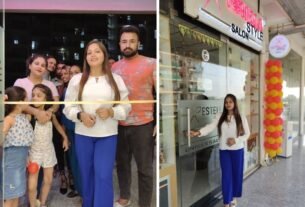New Delhi [India], December 20: Valve disease, particularly aortic stenosis, is a common and potentially fatal condition among elderly patients. Left untreated, it can cause symptoms like shortness of breath, chest pain, fatigue, and even heart failure. However, because of their age, frailty, or co-existing medical conditions, many older adults face significant risks when undergoing traditional open-heart surgery to replace or repair their valve.
Transcatheter Aortic Valve Implantation (TAVI) is a groundbreaking minimally invasive procedure that has altered the landscape of valve disease treatment. Dr. Viveka Kumar, Vice Chairman & Chief of Cath Labs (Pan Max) – Cardiac Sciences at Max Healthcare, is at the forefront of this medical breakthrough, which offers hope and a better quality of life to countless elderly patients.
Understanding TAVI
TAVI, also known as Transcatheter Aortic Valve Replacement (TAVR), is the process of replacing a damaged aortic valve with a prosthetic one via a catheter. The procedure involves making small incisions in the groin, typically through the femoral artery, and does not require open-heart surgery or general anaesthesia.
Dr. Viveka Kumar, a well-known cardiologist, explains, “The TAVI procedure is a game changer, particularly for elderly patients who are at high or intermediate risk for conventional surgery. It is safer, more effective, and requires significantly less recovery time than open surgery.
Benefits of TAVI for Elderly Patients
- Minimally Invasive Nature-For older adults with multiple comorbidities, undergoing a major surgical procedure can be daunting. TAVI’s minimally invasive approach reduces the physical trauma and stress on the body, making it a viable option for patients deemed inoperable or high-risk for traditional surgery.
- Faster Recovery-Unlike open-heart surgery, which requires weeks or months of recovery, patients undergoing TAVI often return to their daily routines within a few days. This is particularly beneficial for elderly patients who prioritize maintaining independence.
- Improved Quality of Life-Many elderly patients experience a dramatic improvement in symptoms such as shortness of breath and fatigue after TAVI. “Our patients often report a renewed sense of energy and well-being within weeks of the procedure,” shares Dr. Kumar.
- Lower Risk of Complications-TAVI is associated with a lower risk of complications such as infections, bleeding, or stroke compared to traditional surgical methods. This is critical for older patients with weakened immune systems or pre-existing conditions.
- Expanded Eligibility-Recent advancements in technology and techniques have made TAVI accessible to a broader range of patients, including those with intermediate surgical risk profiles. Dr. Kumar highlights that this inclusivity ensures more elderly patients can benefit from life-saving treatment.
The Expertise of Dr. Viveka Kumar
As Vice Chairman & Chief of Cath Labs (Pan Max) – Cardiac Sciences at Max Healthcare, Dr. Viveka Kumar brings unparalleled expertise to the field of interventional cardiology. His vast experience and commitment to adopting cutting-edge technologies have positioned him as a pioneer in performing TAVI procedures in India.
Patient Success Stories
Dr. Kumar recounts numerous success stories where elderly patients, once limited by severe symptoms of aortic stenosis, have regained their independence and quality of life post-TAVI.
One such patient, a 69-year-old patient with severe calcified aortic stenosis. The innovative OCTAPRO 29 mm valve ensured excellent outcomes with a smooth recovery and same-day discharge.
For those grappling with valve disease, consulting an experienced interventional cardiologist like Dr. Viveka Kumar could be the first step towards a healthier and more fulfilling life.
Disclaimer: This article is for general information purposes only and should not be construed as professional medical advice. Always consult your doctor before taking any step.



